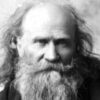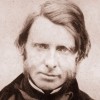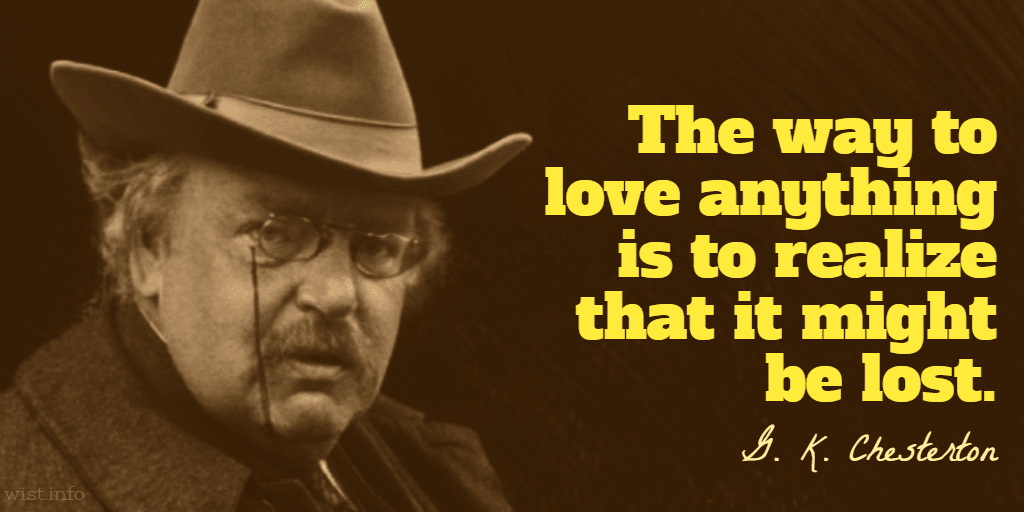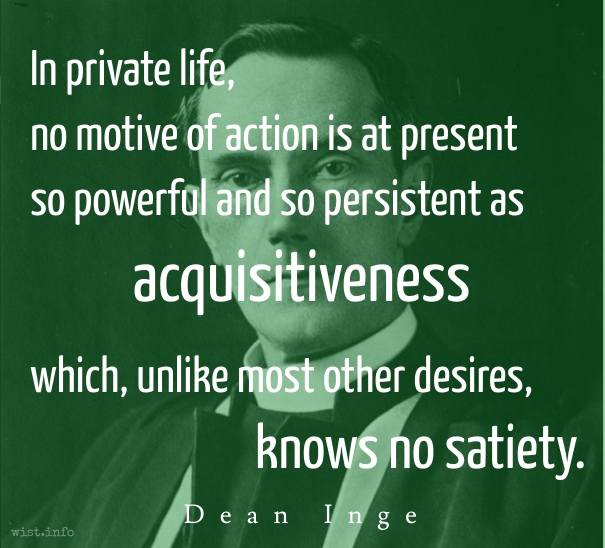For a possession which is not diminished by being shared with others, if it is possessed and not shared, is not yet possessed as it ought to be possessed.
[Omnis enim res quae dando non deficit, dum habetur et non datur, nondum habetur quomodo habenda est.]
Augustine of Hippo (354-430) Christian church father, philosopher, saint [b. Aurelius Augustinus]
On Christian Doctrine [De Doctrina Christiana], Book 1, ch. 1 / § 1 (1.1.1) (AD 397) [tr. Shaw (1858)]
(Source)
(Source (Latin)). Alternate translations:
Everything which does not decrease on being given away is not properly owned when it is owned and not given.
[tr. Robertson (1958)]
For everything which does not give out when given away is not yet possessed in the way in which it should be possessed, while it is possessed and not given away.
[tr. Green (1995)]
For if a thing is not diminished by being shared with others, it is not rightly owned if it is only owned and not shared.
[Example]
Quotations about:
possession
Note not all quotations have been tagged, so Search may find additional quotes on this topic.
For all you can hold in your cold dead hand
Is what you have given away.Joaquin Miller (1837-1913) American poet [pen name of Cincinnatus Heine (or Hiner) Miller]
“Peter Cooper (Died 1883),” ll. 11-12, In Classic Shades and Other Poems (1890)
(Source)
This phrasing of the sentiment seems to have been made by Miller, but the sentiment itself predates him in various ways. See, for example, Martial, Epigram 5.42 (AD 90): "You keep thus always what you gave."
Edward Gibbon, in his Decline and Fall of the Roman Empire,, ch. 61 (1776), notes the epitaph of 15th Century Earl Edward Courtenay of Devonshire:
What we gave, we have;
What we spent, we had;
What we left, we lost.
Miller was himself quoted by Edwin M. Poteat, President of Furman University, in his poem "What You Have Given Away" (1909). Poteat put the phrase in quotation marks, but is sometimes still given full credit.
Elbert Hubbard may have been borrowing from Miller in his Little Journeys to the Homes of the Great, Vol. 12 "Great Scientists," "Haeckel" (collected in 1916, but published earlier), where he writes:
We keep things by giving them to others. The dead carry in their clenched hands only that which they have given away; and the living carry only the love in their hearts which they have bestowed on others.
Finally, often in the variant form "All we can hold in our cold dead hands is what we have given away," the phrase is today often identified as a Sanskrit proverb. The universality of thought means it may well have an ancient Indian inspiration, but the language may indicate a tie to Miller's poem, as promulgated. The "Sanscrit proverb" appears as such in Hoyt's New Cyclopedia of Practical Quotations (1922), but not in the 1896 edition. This may be taken from a letter to the editor, New York Times (1908-07-25) by Emily Noble, identifying this as the translation of a Sanskrit proverb.
Many pleasant things are better when they belong to someone else. You can enjoy them more that way. The first day, pleasure belongs to the owner; after that, to others. When things belong to others, we enjoy them twice as much, without the risk of losing them, and with the pleasure of novelty. Everything tastes better when we are deprived of it.
[Muchas cosas de gusto no se han de poseer en propiedad. Más se goza de ellas ajenas que propias. El primer día es lo bueno para su dueño, los demás para los extraños. Gózanse las cosas ajenas con doblada fruición, esto es, sin el riesgo del daño y con el gusto de la novedad. Sabe todo mejor a privación.]
Baltasar Gracián y Morales (1601-1658) Spanish Jesuit priest, writer, philosopher
The Art of Worldly Wisdom [Oráculo Manual y Arte de Prudencia], § 264 (1647) [tr. Maurer (1992)]
(Source)
(Source (Spanish)). Alternate translations:
Many things that serve for pleasure, ought not to be peculiar. One enjoys more of what is another's, than of what belongs to himself. The first day is for the Master, and all the rest for Strangers. One doubly enjoys what belongs to others, that's to say, not only without fear of loss, but also with the pleasure of Novelty. Privation makes every thing better.
[Flesher ed. (1685), §263]
Many things of Taste one should not possess oneself. One enjoys them better if another's than if one's own. The owner has the good of them the first day, for all the rest of the time they are for others. You take a double enjoyment in other men's property, being without fear of spoiling it and with the pleasure of novelty. Everything tastes better for having been without it.
[tr. Jacobs (1892)]
Many of the things that bring delight should not be owned. They are more enjoyed if another's, than if yours; the first day they give pleasure to the owner, but in all the rest to the others: what belongs to another rejoices doubly, because without the risk of going stale, and with the satisfaction of freshness; everything tastes better after fasting.
[tr. Fischer (1937)]
OLD LADY: Our content
Is our best having.William Shakespeare (1564-1616) English dramatist and poet
Henry VIII, Act 2, sc. 3, l. 27ff (2.3.27-28) (1613)
(Source)
To have and not give is in some cases worse than stealing.
[Haben und nichts geben, ist in manchen Fällen schlechter als stehlen.]
Marie von Ebner-Eschenbach (1830-1916) Austrian writer
Aphorisms [Aphorismen], No. 41 (1880-1893) [tr. Wister (1882)]
(Source)
(Source (German)). Alternate translation:
To have and not give is in some instances worse than stealing.
[tr. Scrase/Mieder (1994)]
Wise is he who instead of grieving over what he lacks delights in what he has.
[Εὐγνώμων ὁ μὴ λυπεόμενος ἐφ’ οἷσιν οὐκ ἔχει, ἀλλὰ χαίρων ἐφ’ οἷσιν ἔχει.]
Democritus (c. 460 BC - c. 370 BC) Greek philosopher
Frag. 231 (Diels) [tr. @sententiq (2016)]
(Source)
Original Greek. Diels citation "231 (61 N.)"; collected in Joannes Stobaeus (Stobaios) Anthologium III, 17, 25. Bakewell lists this under "The Golden Sayings of Democritus." Freeman notes this as one of the Gnômae, from a collection called "Maxims of Democratês," but because Stobaeus quotes many of these as "Maxims of Democritus," they are generally attributed to the latter. Alternate translations:
- "A sensible man takes pleasure in what he has instead of pining for what he has not." [tr. Bakewell (1907)]
- "The right-minded man is he who is not grieved by what he has not, but enjoys what he has." [tr. Freeman (1948)]
- "A man of sound judgement is not grieved by what he does not possess but rejoices in what he does possess." [tr. Barnes (1987)]
- "A sensible man does not grieve for what he has not, but enjoys what he has." [Source]
We are all more blind to what we have than to what we have not.
Audre Lorde (1934-1992) American writer, feminist, civil rights activist
“Notes from a Trip to Russia,” Sister Outsider (1984)
(Source)
Marrying a woman for her beauty makes no more sense than eating a bird for its singing. But it’s a common mistake nonetheless.
An artist is a creature driven by demons. He doesn’t know why they chose him and he’s usually too busy to wonder why. He is completely amoral in that he will rob, borrow, beg, or steal from anybody and everybody to get the work done.
William Faulkner (1897-1962) American novelist
“The Art of Fiction,” Interview by Jean Stein, Paris Review #12 (Spring 1956)
(Source)
When the accumulation of wealth is no longer of high social importance, there will be great changes in the code of morals. We shall be able to rid ourselves of many of the pseudo-moral principles which have hag-ridden us for two hundred years, by which we have exalted some of the most distasteful of human qualities into the position of the highest virtues. We shall be able to afford to dare to assess the money-motive at its true value. The love of money as a possession — as distinguished from the love of money as a means to the enjoyment and realities of life — will be recognized for what it is, a somewhat disgusting morbidity, one of those semi-criminal, semi-pathological propensities which one hands over with a shudder to the specialists in mental disease.
John Maynard Keynes (1883-1946) English economist
“Economic Possibilities for our Grandchildren,” Nation and Athenaeum (1930-10-11)
(Source)
Originally a society talk in 1920, expanded to a lecture given in Madrid (1930-06). Reprinted in Essays in Persuasion, Part 5, ch. 2 (1931).
What do you suppose makes all men look back to the time of childhood with so much regret (if their childhood has been, in any moderate degree, healthy or peaceful)? That rich charm, which the least possession had for us, was in consequence of the poorness of our treasures. That miraculous aspect of the nature around us, was because we had seen little, and knew less. Each increased possession loads us with a new weariness; every piece of new knowledge diminishes the faculty of admiration; and Death is at last appointed to take us from a scene in which, if we were to stay longer, no gift could satisfy us, and no miracle surprise.
John Ruskin (1819-1900) English art critic, painter, writer, social thinker
The Eagle’s Nest, Lecture 5 “The Power of Contentment in Science and Art,” Sec. 82 (22 Feb 1872)
(Source)
The way to love anything is to realize that it might be lost.
Gilbert Keith Chesterton (1874-1936) English journalist and writer
Tremendous Trifles, “The Advantages of Having One Leg” (1909)
(Source)
It is not merely that the ownership of any substantial share in the national wealth is concentrated to-day in the hands of a few hundred thousand families, and that at the end of an age which began with an affirmation of the rights of property, proprietary rights are, in fact, far from being widely distributed. Nor is it merely that what makes property insecure to-day is not the arbitrary taxation of unconstitutional monarchies or the privileges of an idle noblesse, but the insatiable expansion and aggregation of property itself, which menaces with absorption all property less than the greatest, the small master, the little shopkeeper, the country bank, and has turned the mass of mankind into a proletariat working under the agents and for the profit of those who own.
Songwriting is about getting the demon out of me. It’s like being possessed. You try to go to sleep, but the song won’t let you. So you have to get up and make it into something, and then you’re allowed to sleep. It’s always in the middle of the bloody night, or when you’re half-awake or tired, when your critical faculties are switched off. So letting go is what the whole game is.
The worth of a man does not consist in the truth he possesses, or thinks he possesses, but in the pains he has taken to attain that truth. For his powers are extended not through possession but through the search for truth. In this alone his ever-growing perfection consists.
[Nicht die Wahrheit, in deren Besitz irgend ein Mensch ist, oder zu sein vermeint, sondern die aufrichtige Mühe, die er angewandt hat, hinter die Wahrheit zu kommen, macht den Wert des Menschen. Denn nicht den Besitz, sondern durch die Nachforschung der Wahrheit erweitern sich seine Kräfte, worin allein seine immer wachsende Vollkommenheit bestehet.]
Gotthold Lessing (1729-1781) German playwright, philosopher, dramaturg, writer
Eine Duplik, Part 1 (1778) [tr. Chadwick (1957)]
(Source)
This passage (in the Scott Horton translation below) is given as the epigraph to chapter 19 of Christopher Hitchens, God Is Not Great (2007); this prominence gave it a fair amount of fame. It is identified in Hitchens as being from Lessing's Anti-Goeze tracts (1778), though strictly speaking the passage is actually from Eine Duplik (1778), a different writing by Lessing over the same Fragment Dispute of 1777-1778.
(Source (German)). Alternate translations:
It is not the truth that a man possesses, or believes he possesses, but the honest pains he has taken to get at truth, which makes a man's worth; for it is not by the possession of truth, but by the march after it, that his powers are extended, in which alone his perfection consists.
[Source (1884)]
The true value of a man is not determined by his possession, supposed or real, of Truth, but rather by his sincere exertion to get to the Truth. It is not possession of the Truth, but rather the pursuit of Truth by which he extends his powers and in which his ever-growing perfectibility is to be found.
[tr. Horton (2007)]
Prospect is often better than possession.
Thomas Fuller (1654-1734) English physician, preacher, aphorist, writer
Gnomologia: Adages and Proverbs, #3958 (1732)
(Source)
Human happiness konsists in having what yu want, and wanting what yu hav.
[Human happiness consists in having what you want, and wanting what you have.]
Josh Billings (1818-1885) American humorist, aphorist [pseud. of Henry Wheeler Shaw]
Everybody’s Friend, Or; Josh Billing’s Encyclopedia and Proverbial Philosophy of Wit and Humor, ch. 131 “Affurisms: Plum Pits (1)” (1874)
(Source)
Never a possession, always the possessor, with skin as pale as smoke, and eyes tawny and sharp as yellow wine: Desire is everything you have ever wanted. Whoever you are. Whatever you are.
Everything.
Neil Gaiman (b. 1960) British author, screenwriter, fabulist
Sandman, Book 4. Season of Mists, # 21 “A Prologue” (1990-11)
(Source)
TECMESSA: Ignorant men
Don’t know what good they hold in their hands until
They’ve flung it away.Sophocles (496-406 BC) Greek tragic playwright
Ajax, l. 964 [tr. Moore (1959)]
Alt trans.:
- “Men of perverse opinion do not know / The excellence of what is in their hands, / Till some one dash it from them.” [George Young (1888)]
- "Men of ill judgement oft ignore the good / That lies within their hands, till they have lost it."
- "For those who are base in judgement do not know the good they hold in their hands until they cast it off."
The longest liver and he who will die soonest lose just the same. For the present is the only thing of which a man can be deprived, if it is true that this is the only thing which he has, and that a man cannot lose a thing if he has it not.
Marcus Aurelius (AD 121-180) Roman emperor (161-180), Stoic philosopher
Meditations, Book 2, #14 [tr. Long (1862)]
(Source)
Alternate translations:
- "That life which any the longest liver, or the shortest liver parts with, is for length and duration the very same, for that only which is present, is that, which either of them can lose, as being that only which they have; for that which he hath not, no man can truly be said to lose." [tr. Casaubon (1634), #12]
- "When the longest and shortest lived persons come to die, their loss is equal: for as I observe, the present is their all, and they can suffer no farther." [tr. Collier (1701)]
- "When the longest and shortest-lived persons come to die, their loss is equal; they can but lose the present as being the only thing they have; for that which he has not, no man can be truly said to lose." [tr. Zimmern (1887)]
- "The longest-lived and the shortest-lived man, when they come to die, lose one and the same thing." [tr. Morgan, in Bartlett's Familiar Quotations (1894)]
- "The longest-lived and the soonest to die have an equal loss; for it is the present alone of which either will be deprived, since (as we saw) this is all he has and a man does not lose what he has not got." [tr. Farquharson (1944)]
- "When the longest- and shortest-lived of us come to die, their loss is precisely equal. For the sole thing of which any man can be deprived is the present; since this is all he owns, and nobody can lose what is not his." [tr. Staniforth (1964)]
- "The longest-lived and those who will die soonest lose the same thing. The present is all that they give up, since that is all you have, and what you do not have, you cannot lose." [tr. Hays (2003)]
Those two fatal words, Mine and Thine.
Miguel de Cervantes (1547-1616) Spanish novelist
Don Quixote, Part 1, Book 2, ch. 11 (1605) [tr. Motteux & Ozell (1743)]
(Source)
Alt trans.:
- "Oh happy age, which our first parents called the age of gold! not because gold, so much adored in this iron-age, was then easily purchased, but because those two fatal words, mine and thine, were distinctions unknown to the people of those fortunate times." [Full version of the above]
- "Happy the age, happy the time, to which the ancients gave the name of golden, not because in that fortunate age the gold so coveted in this our iron one was gained without toil, but because they that lived in it knew not the two words 'mine' and 'thine'!" [tr. Ormsby (1885)]
- "Happy age, and happy days were those, to which the ancients gave the name of golden; not, that gold, which in these our iron-times, is so much esteemed, was to be acquired without trouble, in that fortunate period; but, because people then, were ignorant of those two words MINE and THINE." [tr. Smollett (1976), as Part 1, Book 1, ch. 3]
Most people seek after what they do not possess and thus are enslaved by the very things they want to acquire. They become prisoners of their desires even though they appear to be free.
































